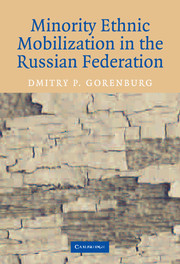Book contents
- Frontmatter
- Contents
- List of Figures and Tables
- Preface
- 1 Minority Ethnic Mobilization in Russia: An Introduction
- 2 Explaining Ethnic Mobilization: The Role of Ethnic Institutions
- 3 From Cultural Society to Popular Front: The Formation and Development of Nationalist Organizations
- 4 The Soviet Institutional Legacy and Ethno-Nationalist Ideology
- 5 Institutions Matter: Measuring Support for Nationalism
- 6 Intragroup Variation in Support for Nationalism: Not All Ethnics Are the Same
- 7 Outcomes: Did Regional Governments Adopt the Nationalist Agenda?
- 8 The Larger Picture: Support for Nationalism in Russia's Other Republics
- 9 Institutions and Nationalism
- Appendix: Construction of Variables and Indices
- References
- Index
9 - Institutions and Nationalism
Published online by Cambridge University Press: 15 December 2009
- Frontmatter
- Contents
- List of Figures and Tables
- Preface
- 1 Minority Ethnic Mobilization in Russia: An Introduction
- 2 Explaining Ethnic Mobilization: The Role of Ethnic Institutions
- 3 From Cultural Society to Popular Front: The Formation and Development of Nationalist Organizations
- 4 The Soviet Institutional Legacy and Ethno-Nationalist Ideology
- 5 Institutions Matter: Measuring Support for Nationalism
- 6 Intragroup Variation in Support for Nationalism: Not All Ethnics Are the Same
- 7 Outcomes: Did Regional Governments Adopt the Nationalist Agenda?
- 8 The Larger Picture: Support for Nationalism in Russia's Other Republics
- 9 Institutions and Nationalism
- Appendix: Construction of Variables and Indices
- References
- Index
Summary
This study began with two contrasting vignettes that illustrated the range of variation in the mobilizing power of minority nationalism in Russia's ethnic regions. I have shown that these differences are the product of variations in the development of ethnic institutions in these regions. I have also explained the mechanisms through which these institutions have affected the extent of ethnic mobilization. In this chapter, after a brief summary of the explanation, I examine its empirical and theoretical implications. Empirically, the interaction between mass-based nationalist movements and local political elites has important implications for the future of center-periphery relations in the Russian Federation, foreshadowing a time when the forces of civil society will be able to constrain the policy options available to the governing elite.
This study also has theoretical implications for three areas of scholarship. For students of ethnic mobilization, the study demonstrates the importance of institutions for structuring not just the extent and form of ethnic mobilization, but even the identity categories on which such mobilization is based. At the same time, the mass-based approach highlights the importance of actors outside the political elite in determining the course of ethnic mobilization. Ethnic mobilization may spiral into violence because of internal movement dynamics, rather than because of the characteristics of groups, ethnic security dilemmas, or particular sets of economic and political incentives.
- Type
- Chapter
- Information
- Minority Ethnic Mobilization in the Russian Federation , pp. 257 - 271Publisher: Cambridge University PressPrint publication year: 2003



